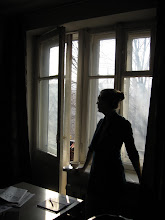 This week I encountered two of the leading bands in Kazakhstan's current "world music" trend: Roksonaki and Urker. I'd been looking forward to meeting the members of Roksonaki ever since I heard about their U.S. tour this year, arranged by an American anthropologist (who is also now they record producer - yikes, maybe i should be asking her for a job!). You can read about it on their tour blog here.
This week I encountered two of the leading bands in Kazakhstan's current "world music" trend: Roksonaki and Urker. I'd been looking forward to meeting the members of Roksonaki ever since I heard about their U.S. tour this year, arranged by an American anthropologist (who is also now they record producer - yikes, maybe i should be asking her for a job!). You can read about it on their tour blog here.Roksonaki was started in 1990 by Ruslan Kara [right], who tried to mesh together Kazakh traditional music with the sounds of American/European art rock music he had grown up listening to. He now writes most of the band's songs, plays guitar, and sings; the other two band members, Galymzhan Sekeyev [center] and Erlan Sabitov [left], play the Kazakh instruments kyl-kobyz and zhetigen, respectively. Their songs are all in Kazakh language and draw on a variety of themes, including a fairly strong leaning toward shamanistic sounds and texts. (Check out some of their recent work on their MySpace page here.) In fact, they told me about how several times during their U.S. tour, they performed a song that shamans apparently used to sing in order to bring rain - and that shortly after Roksonaki's performance of this song, either rain or snow soon followed (spooky).
I met with the band and their manager (and Ruslan's wife) Dina Amirova on a Friday afternoon. We sat outside the Academy of Sciences in central Almaty next to my favorite fountain (the zodiac one, remember?) and talked for almost an hour about the band. I really liked having input from both the band members and from Dina, who is also a musicologist and describes Roksonaki's music in a more analytical light. The band had also worn specially made shirts from their American tour for an impromptu photo shoot (by Dina) that they were planning to send to a radio station back in the U.S. where they had given an interview. By the way, just a bit of Kazakh cultural trivia: the symbol on Galymzhan's black t-shirt is a shangyrak - the centerpiece that is placed at the top of the traditional Kazakh yurt (ui) and signifies Kazakh familial ties and lineage. You see this symbol a lot in these parts - on fences and state buildings, in advertising, even on the Kyrgyz flag (since they were nomads too and very closely related to the Kazakhs).
On another interesting note - as we were saying goodbye, a few drops of rain started falling, and turned into a huge downpour that didn't stop until late that night! Apparently the rain gods are still listening to these guys...
 The following Saturday, I headed to a huuuuuge new mall - the biggest in Almaty, and appropriately named MEGA (in capital letters) - to attend the presentation of Urker's new album, Tolghau (Melody). I've mentioned this band on the blog before, and I have known the lead singer, Aidos Sagat [right], since my last fieldwork stint in Almaty. Unlike Roksonaki, who prefer not to classify themselves, Urker describes its combination of traditional and modern music as "ethno-pop." Aidos writes most of the band's songs, and Nurlan Alban [center] writes the lyrics - so these two bands are actually doing very original stuff, which is remarkable in a city that is teeming with cover bands (albeit often very talented ones)! Aidos and Nurlan also share vocals, and Rustam Musin [left] plays lead guitar.
The following Saturday, I headed to a huuuuuge new mall - the biggest in Almaty, and appropriately named MEGA (in capital letters) - to attend the presentation of Urker's new album, Tolghau (Melody). I've mentioned this band on the blog before, and I have known the lead singer, Aidos Sagat [right], since my last fieldwork stint in Almaty. Unlike Roksonaki, who prefer not to classify themselves, Urker describes its combination of traditional and modern music as "ethno-pop." Aidos writes most of the band's songs, and Nurlan Alban [center] writes the lyrics - so these two bands are actually doing very original stuff, which is remarkable in a city that is teeming with cover bands (albeit often very talented ones)! Aidos and Nurlan also share vocals, and Rustam Musin [left] plays lead guitar.As part of the presentation, Urker gave an hour-long concert of new and old songs. A pretty large crowd gathered to hear them play (as will often happen in a busy mall, i guess) and people were singing and bouncing along with the older songs that they clearly recognized. As for me, their live performance was way better than anything I'd heard on their albums - they were rocking some of the songs pretty hard (unusual for them) and they clearly fed off of the energy of the crowd.
If you're interested, Urker has a pretty nice website (with an English version available), so check it!


1 comment:
Awesome! I'm glad to hear that you got the interviews -- did you get to talk with Ulutau? I have tried to communicate with Dr. Faller to find out about Roksonaki CDs, but no luck so far. Do you know?
How much longer do you get to stay in Almaty for your research?
Keep up the great posts.
Post a Comment